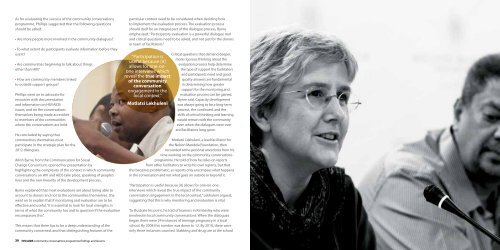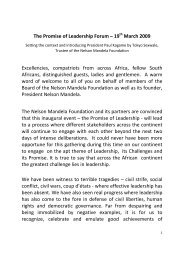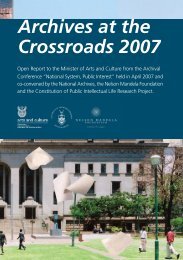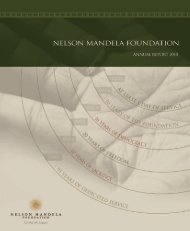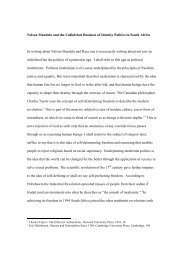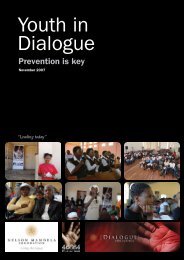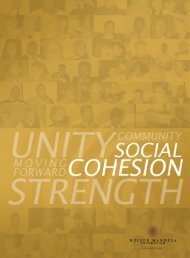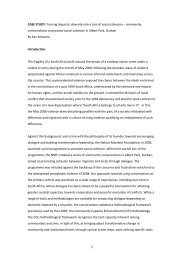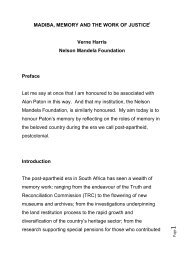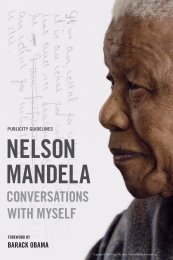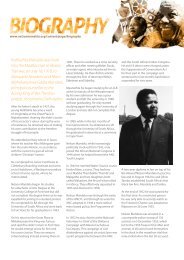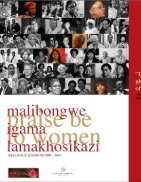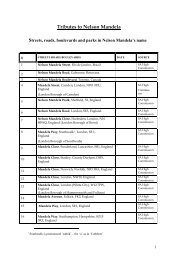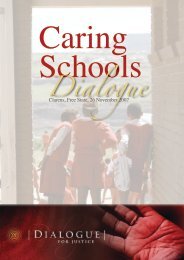Session Four: Institutionalisingthe processAnother session on day two of the HIV/AIDS consultativeforum was a panel discussion on how to institutionalise thecommunity dialogue process. Panellists included Kgosi Letlapeof the Tshepang Trust, Connie Kganakga from the Departmentof Social Development, Gift Buthelezi from the Department ofCommunications and Catherine Sozi from UNAIDS.Addressing the delegates, Letlape said that if the country expectsbehavioural change, then people need to engage their behaviour.“In order for sexual change to happen, people need tomake an effort because it is not a standalone or a DIY.It is between two people, so both people need towant the change to happen,” he said.In recent years Letlape said he hadobserved a subculture in South Africadefined by a lack of responsibility amongthe youth and the use of poverty as anexcuse for laziness. He encouraged thosepresent to address this by telling thoseconcerned the truth about their attitudeand behaviour, and not massaging orsugar-coating the message.“If we don’t communicate with people truthfullyHeston Phillipsthen society won’t be able to make informeddecisions,” he said, arguing that once people had heardthe truth about their actions, they would make better decisions.On the issue of how community conversations can inform highleveldecision making, Letlape said, “If we are dealing with HIV/AIDS and we want to enhance the capacity of communities to dealwith the virus, we need to change the political structure and holdpoliticians accountable.”The Department of Social Development’s Connie Kganakga saiddialogue was important as a means of healing in South Africa.“When we begin to talk about behavioural change as a mode ofintervening in the fight against HIV/AIDS, it is through initiatives likecommunity conversations that we can do those things.“This local insight andinformation helpsprovide a baseline, ameasure of the currentstate of affairs in thecommunity, fromwhich the impact ofany intervention can bedetermined.”“We need to look at social change and encourage people to knowtheir statuses because this will help our communities a great deal,”she continued, saying her department would do its best to lookat community structures and see how they could support andenhance communities’ capacity to act positively.Gift Buthelezi from the Department of Communications saidthat much could be done to raise awareness around communityconversations. “For starters,” he said, “community conversationscan be brought into television and radio and we can work onproducing content that is engaging because we can see thatfacilitators are working hard in communities.”Buthelezi said the CCE is something that communities could use tosolve a number of their issues. “It can be used to encourage globalcitizenship ... It is important that community conversations areincluded in policymaking because they include communities andgovernments, and this would help a great deal.”Catherine Sozi, UNAIDS country co-ordinator, said that SouthAfrica carried the burden of the HIV/AIDS and TB epidemics. Asa developing country, she argued, South Africa still had manyimbalances and issues that needed to be dealt with before HIV/AIDS could be addressed properly.“As a country where mothers die while giving birth and [with] ahigh prevalence of HIV/AIDS, South Africa operates on a differentlevel. Though people say it is a developing country in terms oftechnology, it’s not until people have proper sanitary services thatthe disease can be dealt with.”Sozi said that even though the government had invested a lot ofmoney in finding vaccines for HIV/AIDS and TB, this was not enough.Behaviour change was what needed encouraging, she said.“HIV/AIDS is still regarded as a health issue and people need torealise it’s not a health issue, it is about development. Unlesswe do things differently, nothing is going to change. We needcommunities to identify their own problems,” Sozi said.She added that the government could help to overcome HIV/AIDSby politicising the pandemic to ensure that things are sorted outquickly. “Lots of advocacy needs to be done on all levels. We needto start at provincial level going down and therefore advocacy anddialogue needs to begin,” she said.She then stressed the need for strategic partnerships betweencountries so as to ensure the epidemic is dealt with across nationalborders. “<strong>Community</strong> conversations facilitators need to be spreadout to make sure that their voices are heard,” she said.Session Five: Monitoring andevaluation of community <strong>dialogues</strong>Monitoring and evaluation is an essential component of thecommunity conversations programme, helping to strengthenit, to assess its impact and to ensure positive social changesrelating to HIV and AIDS issues. On the second day of the HIV/AIDSconsultative forum, a session was held on this aspect, and relevantpresentations were given by Heston Phillips from UNAIDS, AilishByrne from the Communication for Social Change Consortium,Motlatsi Lekhuleni from the <strong>Nelson</strong> <strong>Mandela</strong> <strong>Foundation</strong>, andAlison Campbell from AFFIRM Facilitation Associates.Heston Phillips spoke first about the role of UNAIDS in assistingSouth Africa to monitor its progress with respect to the epidemic.Working with and through the South African National AIDS Council(SANAC) in five provinces, UNAIDS representatives try to ensure thatthe local response to HIV/AIDS is decentralised and multi sectoral.Phillips noted the importance of establishing local working groups,so that key stakeholders can be involved in development plans.Stakeholder participation, in turn, helps ensure local participationand ownership, he said.If the response to HIV/AIDS should be decentralised, so shouldmonitoring and evaluation, argued Phillips, saying that this cannotbe done from a distance. Facilitators need to help determinewhat key items should be measured in local communities, andcommunity members themselves should be part of the evaluationprocess. Monitoring and evaluation is not only about informationand data, Phillips said.This local insight and information helps provide a baseline, ameasure of the current state of affairs in the community, fromwhich the impact of any intervention can be determined.28 HIV/AIDS community conversations programme findings and lessons HIV/AIDS community conversations programme findings and lessons29
As for evaluating the success of the community conversationsprogramme, Phillips suggested that the following questionsshould be asked:• Are more people more involved in the community <strong>dialogues</strong>?• To what extent do participants evaluate information before theyuse it?• Are communities beginning to talk about thingsother than HIV?• How are community members linkedto outside support groups?Phillips went on to advocate forresources with documentationand information on HIV/AIDSissues, and on the conversationsthemselves being made accessibleto members of the communitieswhere the conversations are held.He concluded by saying thatcommunities themselves mustparticipate in the strategic plan for the2012 <strong>dialogues</strong>.Ailish Byrne, from the Communication for SocialChange Consortium, opened her presentation byhighlighting the complexity of the context in which communityconversations on HIV and AIDS take place, speaking of people’slives and the non-linearity of the development process.Byrne explained that most evaluations are about being able toaccount to donors and not to the communities themselves. Shewent on to explain that if monitoring and evaluation are to beeffective and useful, “it is essential to look for local strengths interms of what the community has and to question if the evaluationencompasses this”.This means that there has to be a deep understanding of thecommunity concerned, and that distinguishing features of theparticular context need to be considered when deciding howto implement the evaluation process. The evaluation processshould itself be an integral part of the dialogue process, Byrneemphasised. “Participatory evaluation is a powerful dialogue tooland critical questions need to be asked, and not just for the donorsor team of facilitators.”“Participation isuseful because [it]allows for one-ononeinterviews whichreveal the true impactof the communityconversationengagement in thelocal context.”Motlatsi LekhuleniCritical questions that demand deeper,more rigorous thinking about theevaluation process help determinethe type of support the facilitatorsand participants need and goodquality answers are fundamentalin determining how greatersupport for the monitoring andevaluation process can be gained,Byrne said. Capacity developmentwas always going to be a long-termprocess, she continued, and theskills of critical thinking and learningwould remain with the communityeven when the <strong>dialogues</strong> were overand facilitators long gone.Motlatsi Lekhuleni, a lead facilitator forthe <strong>Nelson</strong> <strong>Mandela</strong> <strong>Foundation</strong>, thenrecounted some personal anecdotes from histime working on the community conversationsprogramme. He told of how he relies on reportsfrom other facilitators to write his own reports, but thatthis becomes problematic, as reports only encompass what happensin the conversation and not what goes on outside or beyond it.“Participation is useful because [it] allows for one-on-oneinterviews which reveal the true impact of the communityconversation engagement in the local context,” Lekhuleni argued,suggesting that this is why monitoring and evaluation is vital.To illustrate his point, he told of learners in Kimberley who wereinvolved in local community conversations. When the <strong>dialogues</strong>began there were 24 instances of teenage pregnancy in a localschool. By 2008 this number was down to 12. By 2010, there wereonly three instances counted. Stabbing and drug use at the school30 HIV/AIDS community conversations programme findings and lessons


